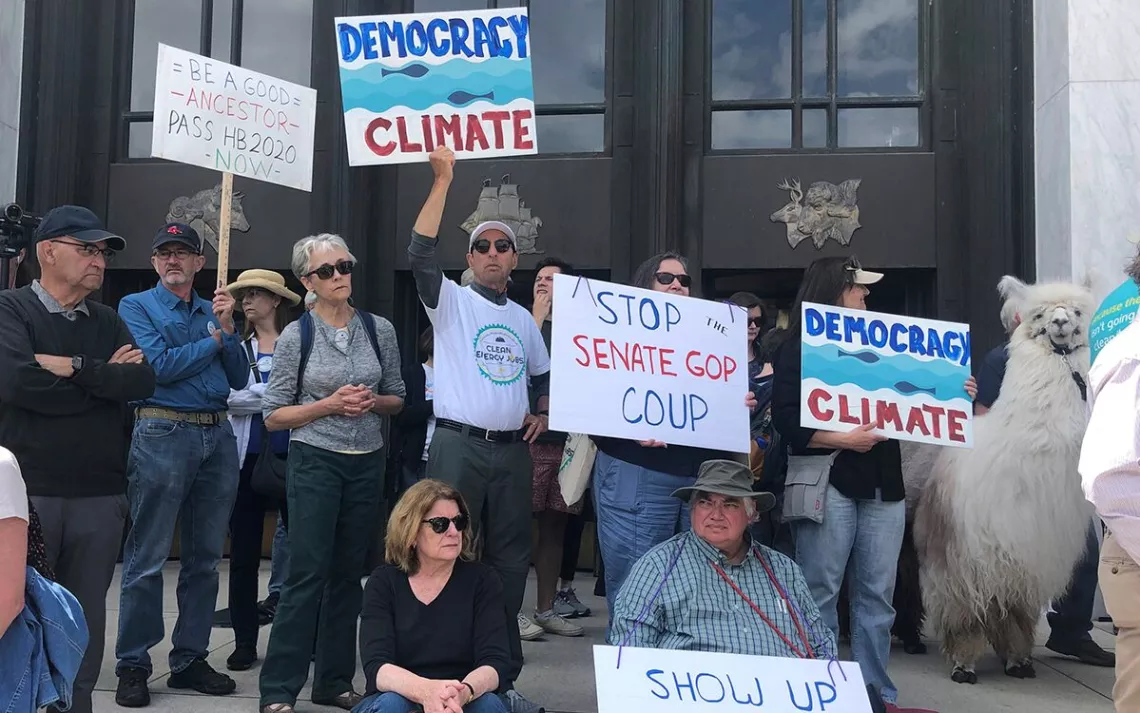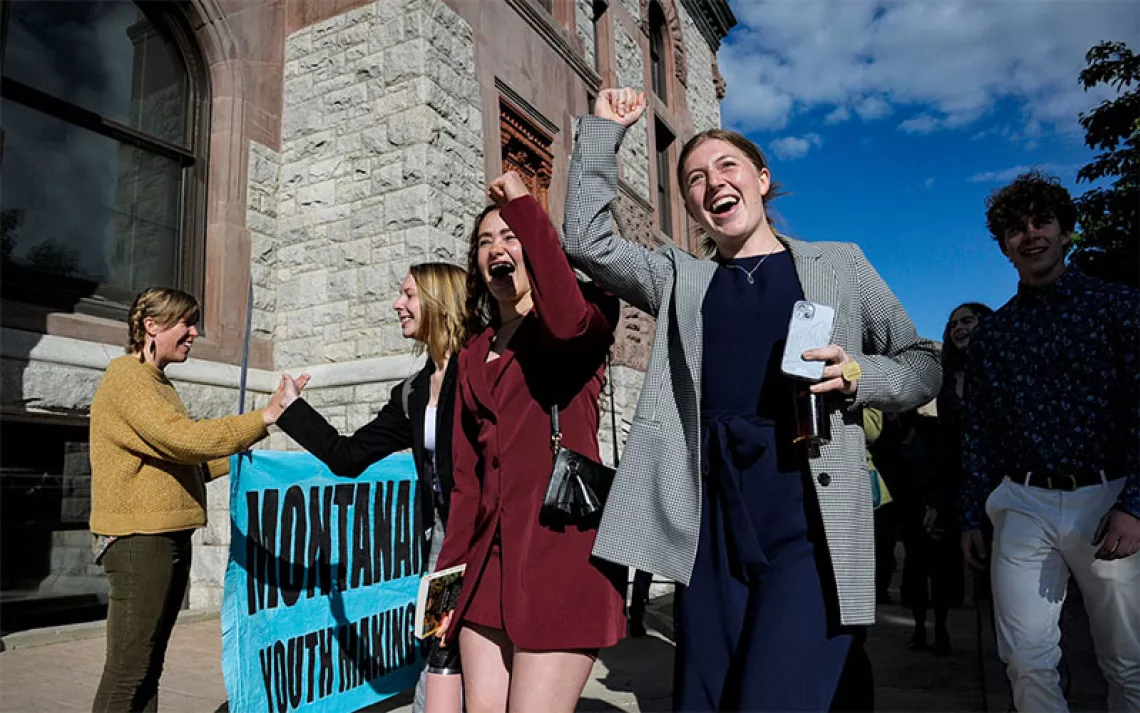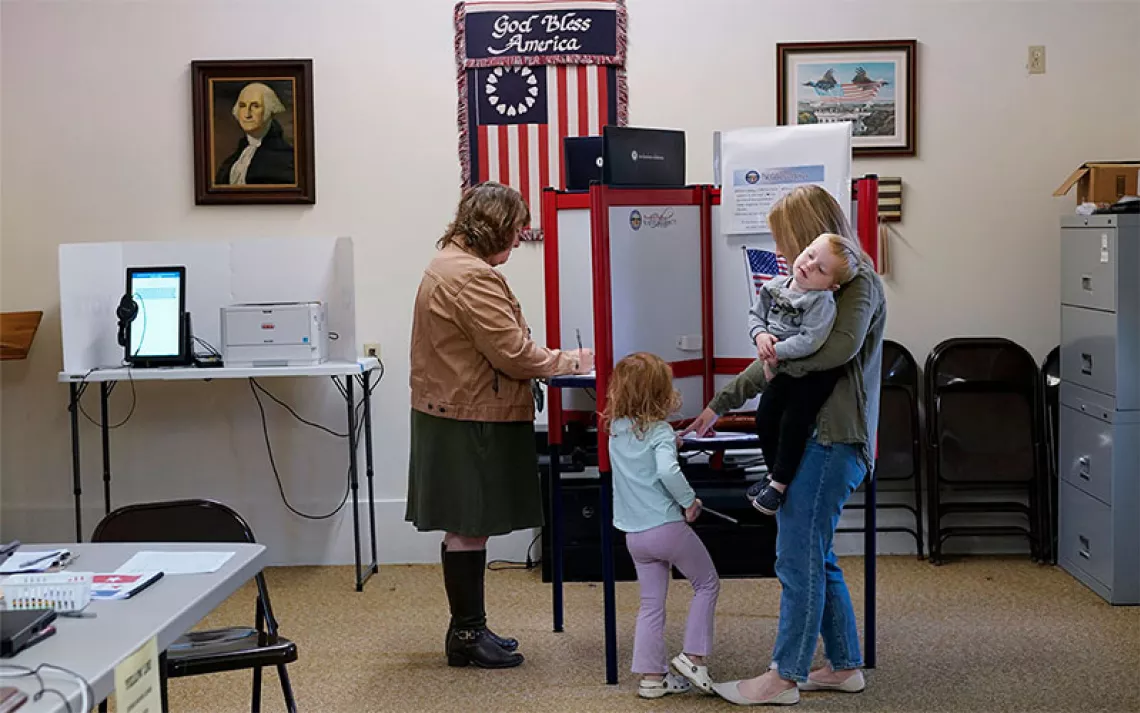Hijacking of Oregon’s Climate Law Is Bad News for Democracy
The circus in Salem is minority mob rule

Climate activists protesting at the Oregon state capitol on June 25. | Photo by AP Photo/Sarah Zimmerman
In a republic, the shape of the future is supposed to rest in the hands of the citizens, who elect legislators to represent their views and pass laws to promote the collective interest. That, in any case, is the political theory upon which American democracy rests. But what happens when that ideal collapses? What happens when, say, an angry and possibly armed minority comes to believe that the political process is antagonistic to their narrow self-interests and decides to withdraw from democratic decision-making altogether? Does politics then become mob rule by the minority?
These aren’t academic questions. They are playing out in real time in Oregon, where 10 days ago Republican state senators went into hiding to prevent the Oregon Senate from passing a landmark climate change bill.
For Oregon environmentalists and their legislative champions who have spent more than a decade working for economy-wide climate legislation, the legislative meltdown is infuriating. But the political melodrama in Salem, the state capital, has ramifications beyond the boundaries of the Beaver State. The Republican minority’s scorched-earth tactics offer an ugly and demoralizing view into the American right’s continued willingness to violate democratic norms. The Salem circus raises disturbing questions about whether US democracy, as currently practiced, will be able to address the existential threat of climate change. If we can’t pass ambitious climate legislation in Oregon—a deep-green (if ideologically and geographically divided) state where Democrats boast a super-majority in the legislature—how can we expect federal legislation on climate when Washington, DC, is equally dysfunctional?
If you’re just tuning in to this saga, here’s what happened:
On Thursday, June 20, all 11 Republican senators refused to show up to work at the capitol in Salem and fled over the state line to Idaho to prevent the Senate from convening (Oregon is one of a handful of states that requires a two-thirds quorum to do business). Governor Kate Brown, a Democrat, called on Oregon state troopers to locate the AWOL legislators and bring them back to the statehouse, and threatened to fine each senator $500 per day of their absence. One Republican senator, Brian Boquist, responded with a threat of violence: “Send bachelors and come heavily armed,” he told an Oregon television station. “I’m not going to be a political prisoner in the state of Oregon. It’s just that simple.”
Right-wing extremists quickly jumped to the GOP senators’ defense. On social media, a quasi-militia group, the Three Percenters of Oregon, some of whose members were involved in the 2016 armed takeover of the Malheur National Wildlife Reserve, said they would provide the senators-in-hiding with “refuge” and “security.” On Saturday, June 22, conservative activists rallied at the statehouse in a show of support for the senators. While the protesters were not armed, the Oregon state troopers were worried enough about violence that they recommended shutting down the capitol building “due to a possible militia threat.”
What are the Republican senators and their supporters so fired up about? The Clean Energy Jobs Bill, or HB 2020, is a climate change law that would put Oregon in the vanguard of states working to reduce greenhouse gas emissions. The law would integrate Oregon into California’s existing cap-and-trade market, the Western Climate Initiative, in which a ceiling is placed on carbon dioxide emissions, and major polluters are required to purchase permits to emit greenhouse gases; over time, the number of permits are reduced, creating market incentives to pollute less.
Environmentalists in Oregon and beyond had celebrated the legislation as a crucial step toward building momentum on greenhouse gas reductions. As Vox writer David Roberts put it in a detailed overview of the bill published before the Republican walkout, “With federal politics a dumpster fire for the foreseeable future, the steady growth of regional carbon trading systems may be the only viable road to a truly national climate policy.”
Now, the tantrum by Oregon Republicans has blocked that route to climate progress. Last Tuesday, Senate president Peter Courtney announced, to the shock and dismay of Oregon climate activists, that HB 2020 didn’t have the votes to pass and that he was pulling it from the floor. On Friday afternoon, the Republican senators returned to the statehouse, having fulfilled their goal of sinking the bill. "Our mission of walking out of this building was to kill cap and trade," Herman Baertschiger Jr., the leader of Oregon's Senate Republicans, crowed at a press conference. "And that's what we did. And I'm proud of this caucus even though it's probably the hardest thing we have ever had to do in all of our lives."
This sorry saga is (yet another) illustration of the difficulties of implementing climate change policies commensurate with the scale of the climate crisis. It’s worth noting that, for the most part, Oregon’s Republican senators do not deny the science of human-driven climate change. But they and their constituents are not willing to accept that tackling climate change will require changes in how we live—foremost among those changes, the price we pay for fossil fuels. According to the Oregon legislative analyst’s office, the bill would have led to a 23-cent-a-gallon increase in gasoline prices by 2021. Many people in Oregon’s rural areas—which are overwhelmingly represented by Republicans—saw that as a threat. “It’s going to ruin so many lives; it’s going to put so many people out of work,” a self-employed Oregon logger told the Associated Press. A “job-killing and truly life-altering bill” is how a Senate GOP spokesman described the proposed law.
Champions of the now-dead bill argue that much of the opposition was based on misinformation—or deliberate disinformation. Representative Karin Power, a Democrat who spearheaded the legislation on the House side, told me that much of the rhetoric she heard against the bill was conflating HB 2020 with a separate measure to regulate diesel truck emissions in the three counties of greater Portland. “There was a lot of misunderstanding, a lot of disinformation out there,” Representative Power said. “I think it came down to a cultural divide—who you believe, who you trust, and who your trusted sources of information are.”
There’s no question that transitioning to a clean energy economy will likely require some hardships and sacrifices—and that these will be unevenly distributed. That’s why HB 2020 included a rebate mechanism to help low-income households cover higher fuel costs as well as special exemptions for the natural gas sector so that low-income ratepayers wouldn’t see a spike in their home heating costs. The fact that the law could have regressive outcomes prompted lawmakers to include in the bill a raft of assistance programs and job-training funds for rural communities and Native American tribes, as well as a refund program for diesel fuel used for farming or forestry.
The implementation of just about any public policy inevitably involves some winners and some losers. Which is exactly why the democratic process is so important—because it allows the various sectors of society to hash out the gains and the losses and to, at least in theory, craft policies that will benefit the majority of people.
Evidently, Oregon’s Senate Republicans have lost faith in that democratic process. When it became apparent that they weren’t going to get what they wanted, they shut down the entire system of lawmaking. Oregon Republicans decided that their narrow agenda should trump democracy.
This lesson hasn’t been lost on Oregon environmental advocates, who express as much grief and anger about the way in which the climate bill sunk as they do with its actual demise. “I’m about as good as can be expected when democracy falls apart,” Tera Hurst, the executive director of Renew Oregon, one of the main advocacy groups behind the climate legislation, told me. “When you start negotiating with, in this case, hostage takers, then you’ll never be able to hold the line again. . . . When you start kowtowing to threats of violence and militias, that’s when it [gets] scary. We couldn’t even come to our capitol and speak, because we were scared a violent militia would show up.”
Not surprisingly, many Oregon Republicans see it differently. Writing on Twitter, E. Werner Reschke, a Republican representative, said the climate bill “was being crammed down our throats in Salem.” Republicans have repeatedly said that the issue should be settled by referendum. “Any carbon bill must be referred to the ballot so the people of Oregon can make the final decision,” a GOP spokesman said in a statement.
Advocates of the climate bill say the claims of an undemocratic or unfair process are ridiculous. Oregon voters already did have a say—on November 6, 2018, when they elected into office a super-majority of Democratic legislators, many of whom had campaigned explicitly on a climate-and-jobs platform. “We flipped seats last November in part with candidates who ran on a clean-energy-future message,” Representative Power said.
And what about this claim that legislation was crafted without Republican input? Power points out that her bill received 22 hours of hearings in Salem alone, and that the legislature held town hall meetings in four communities in different corners of the state. During the course of drafting the bill, 117 amendments were introduced—roughly 75 percent of them from Republicans, according to Hurst at Renew Oregon.
“The bill was a compromise in multiple ways,” Hurst said. “There are some great ambitious climate policy goals in it, but it’s still a compromise from a climate standpoint. And that was the result of Republicans sitting in the room and trying to tone it down.”
Rhett Lawrence, the conservation chair for the Sierra Club’s Oregon Chapter, told me, “[The Republican caucus] had just as much an opportunity to shape the bill and be heard as anyone. Ultimately, they couldn’t get support for their ideas. That’s just the way politics works, right?”
Well, that’s the way politics is supposed to work. These days, compromise is no longer acceptable for many Republicans. They must, it seems, achieve political domination—even if that means violating long-standing norms of American democracy. The GOP shutdown of the Oregon statehouse (actually, their second this year; the first one was over vaccine and gun control legislation) is of a piece with what Tim Dickinson of Rolling Stone calls the "Republican War on Democracy." See, for example, US Senate Majority Leader Mitch McConnell’s refusal to allow a hearing on President Obama’s Supreme Court nominee, Merrick Garland; the ongoing Republican efforts across the country to purge voting rolls and to restrict the suffrage through voter ID laws; and the blatant attempts to hold on to power via gerrymandering, now upheld by a narrow Supreme Court majority who believe, incredibly, that the court has no authority to protect voters’ interests.
Such ruthless political tactics come from a position not of strength but weakness. Republicans in Oregon—like Republicans nationally—know that they are outnumbered. So they are forced to engage in dirty tricks, or gross intimidation and hints of violence, designed to maintain their current power. Or, in the case of Oregon, to hold progressive reforms at bay. The result is a sort of tyranny of the minority.
A republic that is controlled by a minority faction is ungovernable; the shenanigans of Oregon’s Senate Republicans and the anachronistic custom of the US Senate’s filibuster prove as much. If an obstinate minority will not work with a majority that is open to compromise, then it’s hard to reach agreement on the most pressing challenges facing the nation—health care, education, immigration, and climate change, the issue that hangs over all other issues.
“If you can’t trust your elected officials to do their work, that feels like a breakdown in democracy,” Hurst said. “I don’t know where you go from here.”
 The Magazine of The Sierra Club
The Magazine of The Sierra Club



